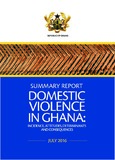| dc.contributor.author | Institute of Development Studies | |
| dc.contributor.author | Ghana Statistical Services | |
| dc.contributor.author | Associates | |
| dc.coverage.spatial | Ghana | en |
| dc.date.accessioned | 2016-09-28T13:26:27Z | |
| dc.date.available | 2016-09-28T13:26:27Z | |
| dc.date.issued | 2016-08-31 | |
| dc.identifier.citation | Institute of Development Studies (IDS), Ghana Statistical Services (GSS) and Associates (2016) Summary Report: Domestic Violence in Ghana: Incidence, Attitudes, Determinants and Consequences. Brighton: IDS. | en |
| dc.identifier.isbn | 978-1-78118-322-9 | |
| dc.identifier.uri | https://opendocs.ids.ac.uk/opendocs/handle/20.500.12413/12376 | |
| dc.description.abstract | This summary report briefly discusses the findings of the Domestic Violence in Ghana research report. The study was commissioned by the Domestic Violence Secretariat of the Ministry of Gender, Children and Social Protection (MoGCSP) of the Government of Ghana and the UK Department for International Development (DFID), and funded by UK aid.
Domestic violence, in the form of physical or sexual violence, is experienced by 35 per cent of women globally during their lifetime. Emotional abuse and controlling behaviour is experienced by 75 per cent of women across the world. It is also acknowledged that men experience domestic violence. Nationally representative statistics on the incidence of domestic violence are, however, hard to come by.
This study represents a comprehensive attempt to estimate the incidence of domestic violence in Ghana, and analyse the attitudes that sustain domestic violence, its determinants and its consequences. The study estimates that 28 per cent of women and 20 per cent of men experienced domestic violence in 2015.
Domestic violence causes immediate devastating consequences to those affected: physical injuries, mental health problems and poor well-being, to name but a few. But it also has long-term, far-reaching effects, including persistent inequalities between men and women, which limit women and girls’ abilities to fulfil their potential. Those who experience domestic violence have longer-term poor physical and mental health, higher risk of contracting HIV and sexually transmitted diseases, and restricted choices in terms of accessing education and jobs. It is also likely that they will have lower levels of education, income and productivity. These consequences are not only life-changing for the women and men concerned, but also for their families, communities and wider societies, as gender inequalities become entrenched.
This innovative mixed-methods study provides an in-depth understanding of the incidence, attitudes, causes and consequences of domestic violence in Ghana, as well as investigating the effectiveness of existing institutional support offered to women and men. | en |
| dc.language.iso | en | en |
| dc.publisher | Institute of Development Studies | en |
| dc.rights | Attribution 4.0 International | * |
| dc.rights.uri | https://creativecommons.org/licenses/by/4.0/ | * |
| dc.subject | Development Policy | en |
| dc.subject | Gender | en |
| dc.subject | Governance | en |
| dc.subject | Poverty | en |
| dc.subject | Rights | en |
| dc.title | Summary Report: Domestic Violence in Ghana: Incidence, Attitudes, Determinants and Consequences | en |
| dc.type | Other | en |
| dc.rights.holder | IDS | en |
| dc.identifier.team | Conflict | en |
| dcterms.dateAccepted | 2016-08-31 | |
| rioxxterms.funder | Department for International Development, UK Government | en |
| rioxxterms.identifier.project | Domestic Violence in Ghana | en |
| rioxxterms.version | NA | en |
| rioxxterms.funder.project | df7c5bd4-7a17-49f9-a8b6-15ce073331fb | en |


